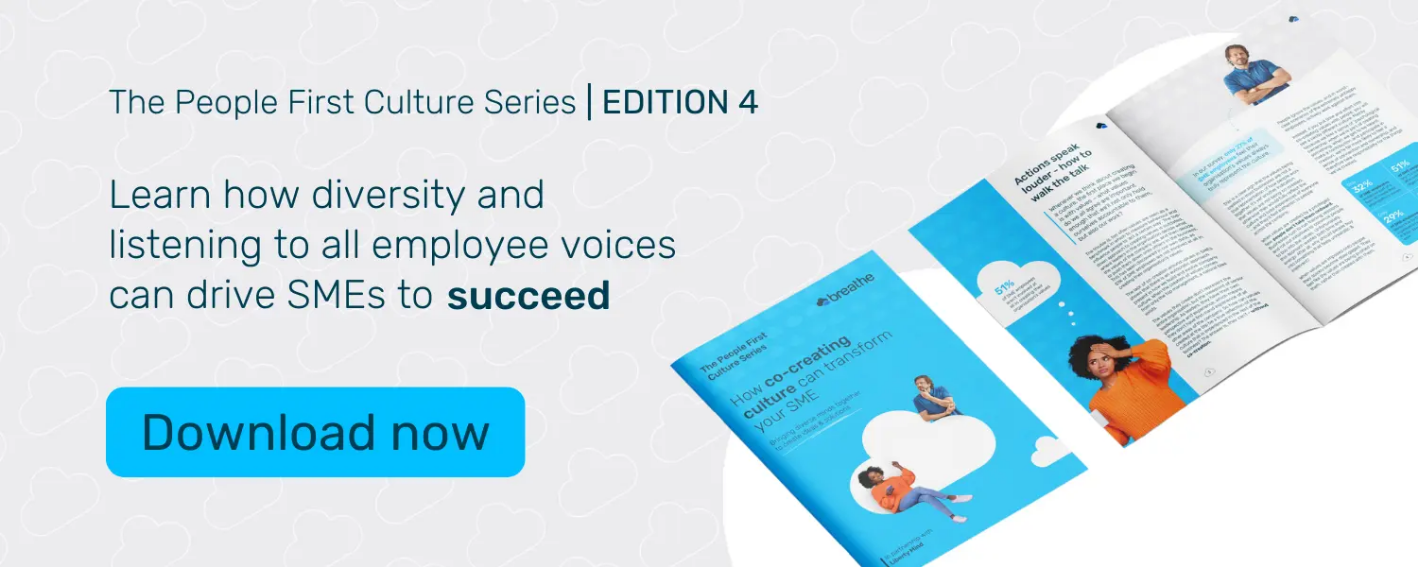Imagine if we all liked the same things, looked the same and acted the same. Life would be pretty dull, right?
The same goes for your workforce - diversity is fundamental for maximum productivity and overall business success.
If every employee made the same decisions, had the same experiences, skills and opinions, you'd kiss goodbye to your strong team dynamic and working relationships - which most likely took you a lot of time and effort to achieve.
In this article we're going to take a look at what a diverse workforce actually looks like, and why you should definitely encourage diversity if you're running a small business.
We'll also share a few tips on how you can create a more inclusive workplace.
Why you should encourage diversity
Why is diversity important in a small business?
8 benefits of encouraging diversity in the workplace
How to create a more inclusive workplace
What is a diverse workforce?
A diverse workforce is made up of people from a wide variety of people from a wide variety of different backgrounds and levels of experience. These may include:
- Ages
- Ethnicities
- Religious & political beliefs
- Gender
- Physical abilities
- Sexual orientation
And you only need to look at the numbers to see why businesses strive for diversity.
For example, a McKinsey report revealed that companies who focus the most on racial and ethnic diversity are 36% more likely to have financial returns that are above average for their industry. It’s strong evidence that building a diverse workforce can directly boost business success.
Why you should encourage diversity
It seems obvious, but a successful football team isn’t made up of only strikers or only
By having a workforce that is better representative of society your business will have access to a wider range of talent, meaning you have a greater chance of finding the right person for your new opening.
Benefits of diversity
In addition, a diverse workforce has also been shown to improve productivity and enable companies to be more financially successful than less diverse ones.
Also, by reinforcing a positive company culture that is diverse and inclusive you are more likely to stop employees looking for jobs elsewhere and reduce staff turnover.
And if that wasn’t enough the Harvard Business Review also found that teams are quicker at solving problems when they’re cognitively diverse.
Why is diversity important?
There's a solid case for founders of small businesses to encourage a diverse working environment right from the start - not just later down the line.
And whilst it may seem like an odd priority when a new venture is still trying to ensure its own survival, getting equality right will have long-lasting benefits.
Here are just some of the reasons that small business employers should be actively building a diverse workforce.
1. Feed the growing workforce
The workforce in general is growing all the time with more women, ethnic minorities and members of the LGBTQ+ community providing valuable skills and experience.
People are increasingly open about who they are. Businesses who embrace this will thrive in the longer term.
2. Greater employee retention
If you fail to create a diverse work environment, you'll potentially create a more hostile environment.
If the workplace atmosphere isn’t great, it can foster a toxic company culture and push employees to pack up their desks and look elsewhere for work.
Increased staff turnover then leads to higher recruiting costs. If your employees feel comfortable, included and valued they’re less likely to look for jobs elsewhere.
3. Improved productivity
There is a fear among some managers that having too diverse a workforce will create more arguments and reduce productivity.
But in reality, however, increased diversity brings a broad range of experience, skills and backgrounds which can certainly have a positive impact.
In an inclusive environment, teamwork and co-operation can thrive, driving a much more productive workforce. As well as finding that ethnically diverse workforce's are more financially successful, McKinsey also found that companies with a more even gender balance are 25% more likely to outperform those who do not.
It’s not enough to just hire diverse talent and expect to see a wealth of positive results, diversity is also about increasing participation, not just symbolic participation or positive discrimination.
Treating your diverse talent equally is what will lead to an inclusive workplace than enables all people to succeed.
4. Wider talent pool to pick from
If you only pick from one section of society, you’re automatically limiting your access to some super-talented candidates.
By opting for diversity, you're opening the business up to a much wider talent pool and a much better chance of getting the right person through the door for a role.
Diversity is inclusive of many factors, and one of them is age. Both older and younger generations can benefit from their respective experience and youth.
As millennials continue to enter and rise in the workplace they want to be part of workplaces that have diversity programmes which seek to create more inclusive company cultures.
5. Great innovation and creativity
Effective problem-solving often involves working with others. And if those people all have different experiences, backgrounds and educations, then it can lead to new and innovative ideas (which might not otherwise have come up).
Scott E. Page describes in his book, The Difference, the addition of diversity in teams as 'super-additivity'. With a diverse collection of people working together, one can make an improvement, then others in the group can improve on that and so on.
Essentially, Page says that improvement builds on improvement in a way that it would not if everyone had similar backgrounds, skills and experience.
It’s a point reinforced by Rocío Lorenzo and her team of researchers who surveyed 171 companies. Watch her TED talk to find out how.
6. Increased boardroom leverage- for the right reasons
There are plenty of stats which show that boardrooms are still dominated by white males.
For example, in the UK's biggest companies, in 2015 there were fewer women than there are men named John on the boards of FTSE firms. Now, nearly all FTSE 100 firms have at least one minority ethnic board member - but we've still got a long way to go.
Yet, boardrooms need to reflect the changing demographics of our world, and by having a diverse boardroom a company can benefit from a much wider range of experience.
Changing for the sake of change won't get you very far. Understanding that diversity and equality are important and prioritising them are two very different things.
An equality report by Accenture found that 76% of leaders prioritise financial performance over diversity (34%) and culture (21%). In order for equality and diversity in the workplace to be successful it should be ingrained into your company culture, not just an afterthought. Diversify for the right reasons, because you believe it's important.
7. Better understanding of your customers
If you have a more diverse workforce you can market your business more effectively to different ethnic and racial backgrounds.
Staff with similar backgrounds can also help promote better understanding between your business and your different customers, as well as help increase your market share.
They can also help your business to understand cultural differences which may actively hamper business growth.
Did you know, for example, that in China and Japan the business card holds special importance and should be given with a much greater reverence than in the UK, and with two hands. You should also receive the card with two hands and have it printed in Chinese or Japanese.
8. Positive employer brand
It’s no longer enough to merely carry out your business function – if you want your business to thrive then you need to create a positive employer brand.
One with a diverse workforce will feed into that brand, showing you as an inclusive and forward-thinking employer. You’ll be considered a brand people want to work with which in turn can boost staff recruitment and business growth.
How to create a more diverse workplace
Make it unique
Small businesses are unique, so your diversity programme should be too. One size certainly does not fit all, so definitely do your research on where you think improvements can be made.
By clearly identifying what you’re trying to achieve you’ll be able to see if you’ve managed to hit your target or not. When you’re able to align your intentions with your implementation you’re going to have a better chance at succeeding.
Have a conversation
The value of communication cannot be overstated. A study by Accenture found that two thirds of leaders believe they create empowering environments, but only one third of employees agree.
One way to close that gap and to achieve a “culture of equality” is to have an honest and productive conversation.
By sitting down and discussing with your team what would make them feel more empowered, not only are you taking steps towards a diverse and equal future but the collaboration ensures that you remain transparent and accountable.
Equality and diversity aren’t just hot topics for the moment, they’ve always been important and will continue to be in all aspects of life.
See where you can improve
While it may be hard or even uncomfortable, if you want to ensure equality and diversity you have to first acknowledge where you may be lacking.
Understanding what unconscious bias is and how you can mitigate it will help you to address practises that you may have been previously unaware of.
The conversation around equality and diversity will continue to happen on a larger scale, but it is important to recognise that we all bare a personal responsibility to make our workplaces more inclusive.
Taking the time to read, and listen to other people’s voices enables each of us to gain a better understanding of other people’s experiences.
Taking steps to becoming a more diverse and inclusive business is an ongoing commitment but can transform your business. You can take some of the pressure off by working with an HR expert. Take a look at our network of accredited HR partners to find someone who can help your SME.

Author: Laura Sands
Laura is a writer who enjoys getting into the detail of subjects and sharing that knowledge with snappy, interesting content. When not typing away, she enjoys walks in the woods and curling up with a good book and mug of something hot.
.webp)





%20(1).jpg)